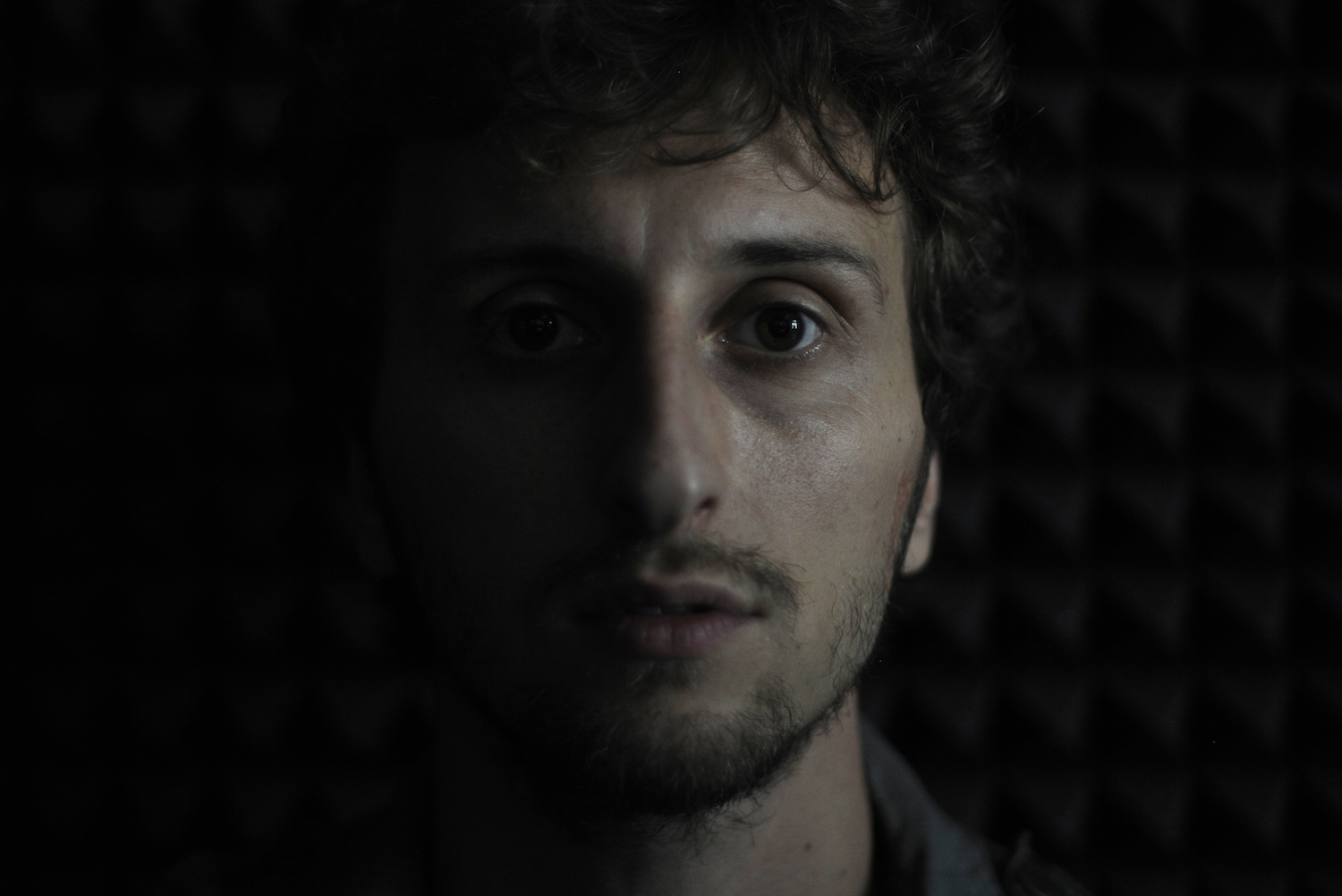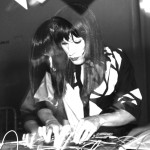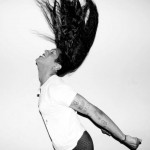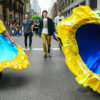Photo RICCARDO MALBERTI
“After five years of running the label,” explains Stroboscopic Artefacts founder Luca Mortellaro (better known as Lucy), “I’ve found that the most evergreen records are the ones that provoke a debate when they come out. If everything is fine—’so cool, so amazing, wow, great!’—then you’re just hitting the spot of everyone’s expectations. That’s not really satisfying to me.”
No wonder why Mortellaro can’t seem to sit still; aside from keeping fans guessing with his own solo material, the DJ/producer has spent the past couple years collaborating with Ben Klock and Speedy J, curating a five-volume anniversary series, and bringing a sense of balance to fellow Berliners at a monthly sound bath meditation. Meanwhile, the Stroboscopic Artefacts stable has maintained its middle ground between living room listens and more visceral club music. It’s been that way from the start, too.
“The very first EP from Xhin—the second release on the label, from back in 2009—sounds like a very powerful techno release now,” says Mortellaro, “but at that time, there wasn’t anything remotely similar. And then six months to a year after that, I started hearing those sorts of things. That’s quite a beautiful feeling—the feeling that you’re not just using the scene for your own sake. You’re shaping it. It’s a give and take.”
In the following Label of the Month feature, the Palermo native reflects on the past five years and presents an exclusive live set featuring nearly all the tracks from Stroboscopic’s most recent 12-inches. “[There’s] no better way to give an insight on where we stand in terms of our main vinyl series,” he says, “mainly dedicated to our own utopia of a club soundtrack.”
Tracklisting:
Zeitgeber – Totemism [Stroboscopic Artefacts]
Lakker – Pier [Stroboscopic Artefacts]
Pfirter – Atman [Stroboscopic Artefacts]
Tommy Four Seven – fffff [Stroboscopic Artefacts]
Dscrd – Apparition Hill [Stroboscopic Artefacts]
Dadub – Force Continuum Abuse [Stroboscopic Artefacts]
Perc – Tri-City [Stroboscopic Artefacts]
Kangding Ray – Luna [Stroboscopic Artefacts]
Eomac – I Am Starting To Believe [Stroboscopic Artefacts]
L.B. Dub Corp – Take It Down Again (In Dub) [Stroboscopic Artefacts]
Chevel – Alicia [Stroboscopic Artefacts]
Jonas Kopp – Shibu [Stroboscopic Artefacts]
Rrose – Drwoned By Sight [Stroboscopic Artefacts]
Donato Dozzy – OZ Taped [Stroboscopic Artefacts]
Sendai – Inverse Array 1 [Stroboscopic Artefacts]
Xhin – Blade Moth [Stroboscopic Artefacts]
Lucy – Rema Rema Canoero [Stroboscopic Artefacts]
[youlist pid=”PLv_069ekoIpmZn0W9Bi-GAcoJhRgschYG” width=”620″ height=”349″]
You’ve played some shows with Speedy J recently. Are you two working on more Zeitgeber material?
Yeah, we’re working on it. We go with the flow; there’s not much talking with it.
You usually work together in the studio then, as opposed to trading tracks online?
We never exchange files. We only work [together] in person.
Do you prefer that process with other producers? Did things work the same way with Silent Servant and Ben Klock?
Silent Servant was a bit different because we started together when I was in LA, but then we started dubbing the tracks on his equipment and mine until they were ready. With Jochem, it’s a bit different because we decided to not send files. Since we live not that far from one another, it’s doable and much more fun.
You seem like the kind of person who’d rather feed off someone’s energy in person than do things online.
Definitely. It’s absolutely necessary on the creative side. At the moment, I’m kinda avoiding remixes because I found the process a bit too sterile at one point. The next one I’ll accept will be only if the producer attends the remix session.
They’d just observe what you’re doing or participate more directly?
Just feeling the energy together. It doesn’t have to be something that’s spoken. It’s about their presence.
Otherwise a remix just feels like a paycheck.
Exactly. It can lose its identity really easily otherwise. That’s why it’s important to keep the synergistic level high.
[youlist pid=”PLv_069ekoIpkkAmfN5i4cqKTy8x4etBct” width=”620″ height=”349″]
So what’s the story with your new [War Lullaby] EP? You and Ben have known each other for a while now; is this something you talked about before?
Well we both live in Berlin and hang out in similar places, so we’d been talking for several years about meeting up. When he finally came to my studio in early January, we immediately started tweaking machines and said, “Oh, that sounds cool. Let’s record some of it.” The thing transformed into a real production session without us noticing if you know what I mean. When it was over, the material was consistent enough to put out.
You’re exploring a lot of different sounds with it too, not just straightforward dance tracks.
The interesting thing with Ben is there was a lot of talk with those sessions about the [state] of the scene, where techno is right now. There’s a sense of responsibility, of being an artist who shapes the scene. You have to be aware of the power you have. Me and Ben represent two very different, but also very codependent, stages of where the scene has been in the city. It’s like we below to two different generations of the techno revival from the past few years. It was very interesting to see what that means creatively when you put your hands on the synths and shape the sound in a certain way.
What role do you feel like you have in the greater techno scene right now?
What I’m trying to do personally, and also collectively with the label, is having legs in two different places. On one side, there’s always this magnetism towards the dancefloor ritual—getting lost in obsessive patterns and rhythms—and on the other, there’s this tendency towards a more solipsistic experience, mostly ambient or very experimental music. I can’t see these two things in opposition to one another. For example, when I play a DJ set, there are some really magical moments where the tension goes up and up. And then at some point, there are moments where you travel away, where your mind zooms out for a moment and I feel like there’s no difference between a drone and a straight kick drum. They both reach the public in similar ways. It’s the moment where you fly.
Your recent four-hour set in Berlin was like that, where you took your time building the tension up and there’s more dynamics going on.
Right. People constantly try to divide what’s ambient and what’s techno. For me, it’s more of a synergistic process; a prime example is an album. That difference doesn’t make sense there anymore. I reach a very similar state of mind and physical and spiritual energy in listening to ambient music or very tough techno. If you think about something like [Aphex Twin’s] Selected Ambient Works, the early reviews called it techno.
Well drone music and techno can both have a very ritualistic feel to it. You can get lost in both of them easily, especially in a live context.
Exactly. What we try to do with the label is make an effort to avoid one vision of what techno is. It’s so easy for that to happen, especially when there’s so much hype. It can easily become a fashion and lose its creative power. You know what you’re gonna get constantly. For me, it’s more about giving the public what they didn’t know they wanted.
[youlist pid=”PLECCE29C0C3F9065D” width=”620″ height=”349″]
What’s an example of that, where you took a chance with the intention of surprising people?
Two prime examples are both of my albums. The first one—Wordplay For Working Bees, back in 2011—was something I produced during the first two years of Stroboscopic. We were still newborn, so there was almost no expectation. It was a very free territory where I could move. When I put it out, I was still a newbie of the scene and the music business. What came out of that was so important to me as a personal process. When I put it out, I was far away from expecting what happened just after—techno clubs actually booking me. It was strange because people label it as a techno album, but there was one track—maybe—that you could play [in a club].
With the second one, things were very different. There was a machine moving around me—a booking agency, a publisher, all the different sides of the industry—and the album was a response to that kind of pressure. I don’t allow any pollution in the creative process, and when you do this, you have to face the reactions. Not that I cared that much, but it’s quite interesting to see how often people get almost angry at you. They’re so stuck on expectations, so if they get something else, some people get really pissed.
“It may not be my cup of tea, but you also have to respect an artist’s own vision if you trust them”
Well your first album got really good reviews, which brought a lot of sudden attention to the label. Was that a mixed blessing since it set you up for a fall in the eyes of some people?
Everyone will always relate to the first time you present yourself to the public. To get rid of this tyranny of expectations, you need to be really careful with your profile. Which is a bit sad.
Is that one of the reasons why the label has been more focused on releasing 12-inches and EPs than albums—because there’s less baggage with them?
Well, with the Monade series for example, they were techno but really uncompromising tracks. And the same with Stellate; I really wanted to show another aspect of each artist. I didn’t want a polished track. It’s like with a painter; I’m more interested in the colors on the palette and where the process starts—this pure, emotional level—than an established track. All of these series are really good triggers for the artist to do something that’s really for them and no one else. They’re almost an excuse to have the artist behave in a way they don’t behave for any other label.
What’s one artist who really surprised you with a track?
The James Ruskin contribution to the Stellate series. They’re two pieces of really amazing contemporary classical music—something I’d never heard from him before, even in his more ambient output. That’s the point; a label manager is like a theater director. You need to create settings in which the actor can give their best. Or if not their best, exactly what that show needs.
How did your recent anniversary series fit into the scheme of things?
The Five Years series was different in that previous series had a lot of rules to follow. I wanted it to be more playful, celebrating the main stronghold where we can express ourselves: the club, but in the SA way.
[youlist pid=”PLv_069ekoIpn_4CJtRDTXGFPqkCDJX0yW” width=”620″ height=”349″]
You’ve been really hands-on with artists in the past, even when they’re only submitting a few songs to the label. Can you remember a record that was frustrating at the time, but ended up stronger because of all the healthy debate that surrounded it?
One very good example is Dadub. We’ve had so many discussions and fights with every one of their releases, and in the end, I realized that’s part of it. The most powerful music comes from this full-of-fire dynamic between the two of us. For example, their album on Stroboscopic, You Are Eternity, came out amazing but the process in between was a lot of back and forth—moments of good and friendly suggestions, and really strong talks about compromises and integrity. It was really special and useful for me to play the counterforce. Those are very creative moments. You don’t realize it right away, but they are.
Well it’s really about pushing one another to the limits, isn’t it?
Exactly. It’s really not about what’s commercial or not; everything is commercial if you sell it. I think it’s a very childish and unreal way of seeing things as either commercial or underground. Once you put something out and are invited to play clubs for a lot of money, everything is commercial. That doesn’t mean your artistic approach needs to be that way. It’s more about maintaining the integrity of your vision.
The label has a certain aesthetic to it though, so you must feel like everything on it has to maintain that, even if it’s abstract.
Of course, but it’s not about the sound so much as integrity. If an artist is involved, it’s because I know their profile is really volcanic and promising. When I feel this way, I try to be as invisible as possible, you know? On one side, I give some input, but I let them do their thing. With the main artists on the label—Dadub, Kanding Ray, Lakker—I’ve never said, “I don’t like this track.” It may not be my cup of tea, but you also have to respect an artist’s own vision if you trust them.
In the past, you’ve said you wonder why people call you a techno label at all. Is that because the word techno has a lot of preconceptions with it—a box the label is put into?
It’s a bit provocative when I say that. Of course we’re a techno label; it’s just that all the hype around techno over the past few years could lock us down to certain things. I don’t know what the future is, but over the next few years, I don’t know if we’re going to be doing this or that. We’re a techno label, but I want to keep an approach that sets you free from any kind of boxes. We’re trying to educate our public to keep their ears, soul and heart open, to be able to receive [music] for real.
Your artists also seem to be open to different kinds of performances. Like you recently played a gong piece at a meditation session right? Which is funny, because another one of your artists—Rrose—did something similar recently in New York.
That’s when the magic happens. Rrose and I were following similar processes without even talking about it. He didn’t even know I had been doing this in Berlin for a while already. That’s alchemy, you know? That means there’s a certain deeper connection between the artists on the label.
Were you surprised by the reactions to your gong performance?
Yeah! I do it every first Wednesday of the month at Yellow Yoga, a yoga studio here in Berlin. People actually came the first time, knowing exactly what was going to happen. That helped a lot; it killed any inhibition. People really let go. I still remember hitting the gong and this circle of 50 or 60 people around me on the floor. There was incredible silence and focus there.
It must feel like people really need something like that in a city like Berlin, a place where you can party all night and not know when to stop.
People get stuck in the party wheel. These things aren’t just important in Berlin, though; they’re important in general, with the way our Western civilization works at the moment. I feel we are really stuck in a huge machine. If you stop turning in the right direction on that wheel, you get exchanged in a way. Those are very important spaces of freedom. You have to expect the horizontal view of reality and find a vertical one. It’s a dogma thinking the actual reality is just your work, your relationships, buying food. There’s another side of things that’s more ascetic, and it’s immensely important to me.
What’s one record or performance that became that for you—something that opened a door and helped you look at things differently?
When I first heard Selected Ambient Works by Aphex Twin, I was like 15. It changed everything. I felt something inside me that was hidden explode as soon as I put the needle on the vinyl. That experience still shapes the way I see art and communication with other people.
Why that album?
It was something else—not intellectual, very human, very basic, very communicative. It’s like having a guru tell you very simple things that make everything [look] different.
As for more recent stuff, I still remember one of the triggers for the Stellate series. It was seeing the Dromoscope collective at Berghain. The guys from Plaster were part of it. Berlin was exploding at that time. It was this peak moment that shaped what we have in the scene right now. It was refreshing and passionate—really intense.
How would you describe where the Berlin scene is now and how it’s evolved over the last five years?
Part of the scene is still incredibly boiling, and part of it is just repeating certain archetypes over and over again. I hope the riskier part takes over; otherwise, we’ll repeat the same mistakes that happened in dance music in the middle of the ’90s. Part of it became too mainstream, and the music business turned it into an evil machine. I’d describe it as [opposing] sides at the moment. One is taking advantage of how big the scene became, and one is pushing things forward.
It’s not just Berlin either. France, in my opinion, is becoming a really important stronghold for innovation and really amazing parties. Concrete in Paris, for example. Or things like Corsica Studios, where every time I play there, I feel really free. People allow me to build up a set and tell them a story for five hours. They’re patient and trustful from the point I start playing.
Where do you see the label going over the next five years?
I don’t have any huge targets in my mind. I just want to go on in the most humble way I can, to keep things balanced. For me, the real identity is about smaller things that are almost invisible. They silently shape everything.





